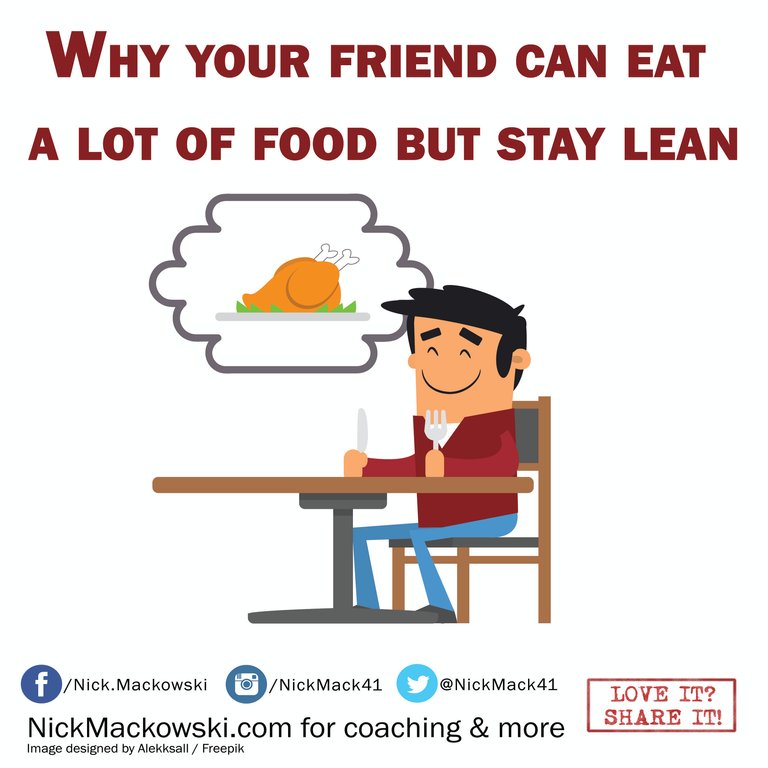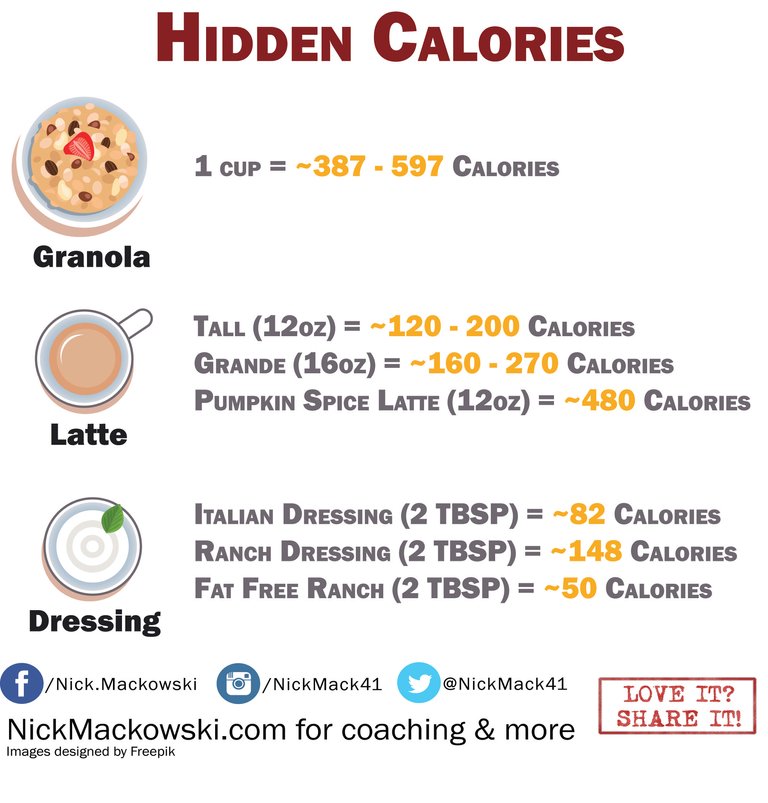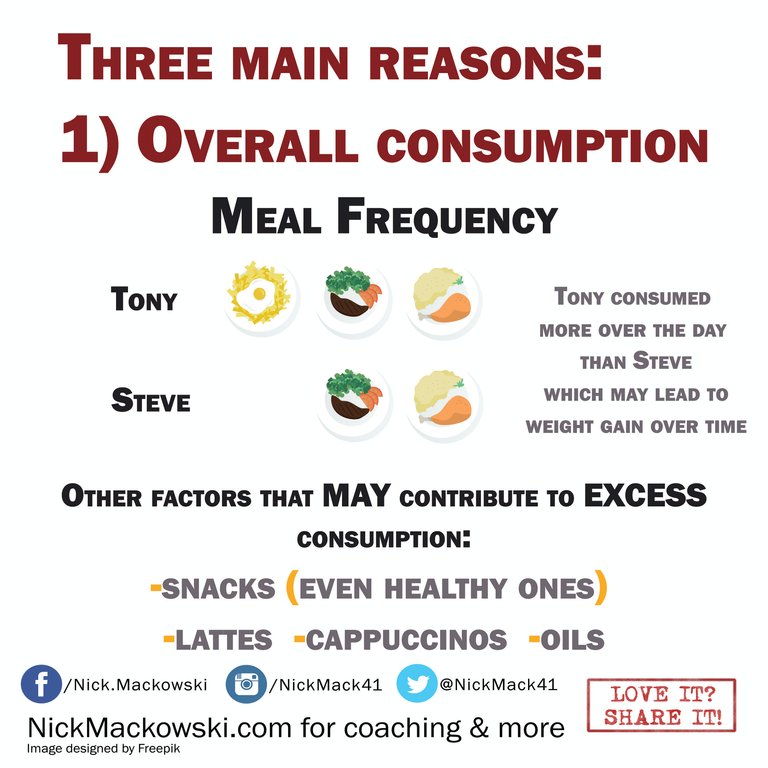
Part 1: WHY YOUR FRIEND CAN EAT A LOT OF FOOD BUT STAY LEAN
3 Main Reasons:
- Overall consumption
- Compensation
- Exercise
1. Overall Consumption
Calorie balance over the course of the day and even week will dictate weight loss/gain but please note that this is different than altering body composition (1). Weight loss does not always equal improved body composition as you can lose muscle if you’re lacking protein, not strength training, and not getting adequate sleep (2).
[ One participant lost 5.3kg (11.7 lbs) during restricted sleep (~5.5 hours per night for 14 days) with ZERO coming from body fat and all 5.3kg (11.7 lbs) coming from lean tissue. So this person lost weight, but no body fat.. That sucks ]
As you can see there are a multitude of factors at play. However, managing caloric balance will be key to alter body composition assuming you get adequate sleep, consume enough protein, and challenge your muscles to a degree.
What Your Friend Does Differently
One reason why your friend can eat a large dinner and not gain weight may be a lower meal frequency. If you both eat 2000 calories, but your friend has it over 2 meals (1000 calories per meal) while you have it over 3 (~667 calories per meal) then your friend will have bigger meals to meet his caloric needs. That big dinner you ate together may have caused you to exceed your caloric needs while your friend stayed at caloric balance. In short, view nutrition over the course of a day and/or week. One meal means very little.
Breakfast or Break-Fast
Research shows that restricting your eating window can be just as beneficial as eating the same number of calories throughout the day with regards to body composition and strength (1). Many people simply skip breakfast and end up 'fasting' from dinner to lunch or roughly 14-18 hours. Anecdotally, some people feel fine delaying or skipping meals and are able to maintain their body composition. There may be a transition period where you get used to the restricted eating window (hunger, lower energy in the morning, etc.), but many learn to enjoy this style of eating. While for others, this style of eating doesn’t work due to medical reasons, exercising/training in the morning, or just enjoying breakfast. In the end, restricting your eating window is a means to an end. Find a meal frequency that works well for you.
[ I like to give credit where it’s due. Fasting has been practiced for religious reasons for many years but a few individuals brought it mainstream through blogs/books: Martin Berkhan, Ori Hofmekler, and Brad Pilon. Not to say there aren’t others, but these are the ones that influenced me. ]
Hidden Calories
Through coaching people, some are surprised to find how many calories they’re actually intaking. These hidden calories can come from snacks (even healthy ones), fats and oils (dressings, restaurant meals), liquid calories (lattes, cappuccinos, sodas, etc.), among others. If your goal is to improve body composition then it will be good to take note of the content of the foods and drinks that you're consuming. If you find something that is adding a sizeable load to your caloric intake then it could be beneficial to look up some reasonable substitutions or adjust portion-sizes.

In The End..
Do not view calories in isolation but view caloric balance over the day and week. This is not to discredit the role of sleep (2) and stress (3) which influence our consumption as well, but that’s for another time.
Post in the comments below how you manage your intake or what you plan to do.
- Do/Will you practice some sort of intermittent fasting / time-restricted eating
- Do/Will you look up the caloric contents and ingredients of you’re intaking? (Not forever, but it can be beneficial for a short period of time)
- Do/Will you do something different? Please share with others below.
Stay tuned for Part 2 which will be arriving soon
Stay Awesome,
@NickMack

- Aragon, A. A., Schoenfeld, B. J., Wildman, R., Kleiner, S., VanDusseldorp, T., Taylor, L., ... & Stout, J. R. (2017). International society of sports nutrition position stand: diets and body composition. Journal of the International Society of Sports Nutrition, 14(1), 16.
- Nedeltcheva, A. V., Kilkus, J. M., Imperial, J., Schoeller, D. A., & Penev, P. D. (2010). Insufficient sleep undermines dietary efforts to reduce adiposity. Annals of internal medicine, 153(7), 435-441.
- Carnell, S., Grillot, C., Ungredda, T., Ellis, S., Mehta, N., Holst, J., & Geliebter, A. (2017). Morning and afternoon appetite and gut hormone responses to meal and stress challenges in obese individuals with and without binge eating disorder. International Journal of Obesity.
Congratulations @nickmack! You received a personal award!
Happy Birthday! - You are on the Steem blockchain for 1 year!
Click here to view your Board
Congratulations @nickmack! You received a personal award!
You can view your badges on your Steem Board and compare to others on the Steem Ranking
Vote for @Steemitboard as a witness to get one more award and increased upvotes!